For months the parties at Stormont have been unable to reach agreement on the restoration of devolution. The biggest sticking point? Whether or not to implement an Irish Language Act.
The positions of the two biggest parties are widely known. Sinn Féin have insisted on a standalone Irish Language Act if Stormont is to be restored; the DUP has moved from outright opposition to promoting some sort of mutual recognition of Ulster-Scots.
But what does the public think? Do voters support the positions of the main parties to date? How would they react if they compromised? And just how much do they actually know (or think) they know about what an Irish Language Act would entail?
The latest LucidTalk poll of public opinion Northern Ireland offers a lot of food for thought.
Let’s start by looking at the DUP’s position on Irish language legislation and public opinion surrounding it. Unsurprisingly, the vast majority of DUP voters (35% of the overall sample) support the party’s stance.
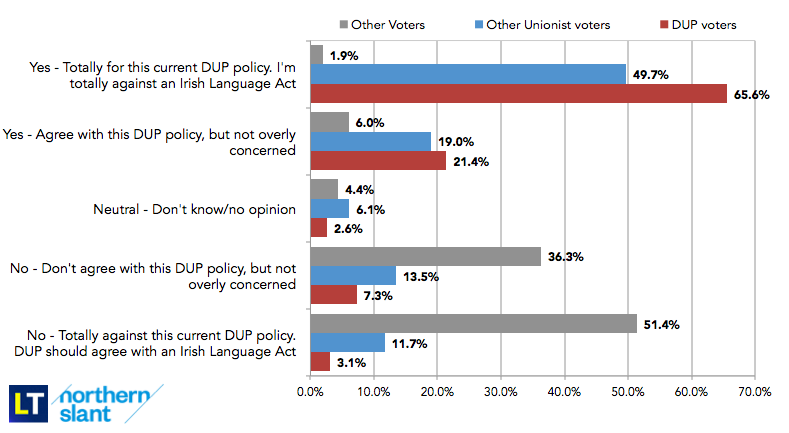
“The current DUP policy is to oppose, or be reluctant to implement, an Irish Language Act. As a … voter, what is your view on this DUP policy?” 2,080 responses (weighted), displaying results for DUP voters, other unionist voters, and voters of other parties (Alliance/Green/independent).
Even among voters who support unionist parties other than the DUP, 70% share its opposition to an Irish Language Act, albeit with less intensity. The lower intensity of opinion may give the UUP some scope to advance a more nuanced position, but it risks alienating some of its own supporters.
There is a very different pattern among voters of Alliance, the Green Party and independent candidates. Out of these individuals, 87% disagree with the DUP’s approach.
If, however, the DUP decided to compromise on its initial position on an Irish Language Act, would its supporters mind? DUP voters are strikingly split down the middle. Half say they would not support the party if it decided to compromise. 45% would accept a compromise on an Irish Language Act, while 5% are unsure.
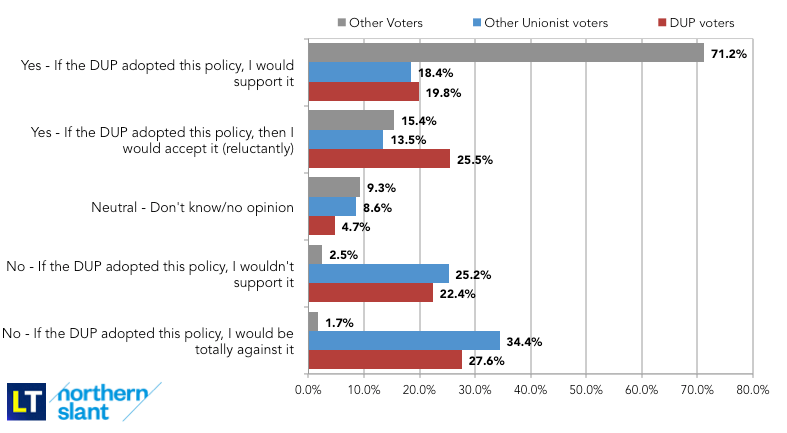
“If the DUP judged that it suited DUP objectives to agree to an Irish Language Act, say as an overall agreement with Sinn Féin, as a … voter, would you agree with this?”2,080 responses (weighted), displaying results for DUP voters, other unionist voters, and voters of other parties (Alliance/Green/independent).
Voters who support unionist parties other than the DUP are even more staunchly opposed to a compromise. 60% say they ‘wouldn’t support’ or would be ‘totally opposed’ to a climb-down by the DUP. It is difficult to say, however, whether this means that these voters are more hostile to any form of compromise or whether, as non-DUP voters in the first place, they would simply find it more frustrating for the DUP to ultimately back down on something it once insisted would never happen under its watch.
Supporters of ‘other’ parties, meanwhile, would overwhelmingly welcome a change of course from the DUP. This is hardly surprising, and unlikely to win the DUP any extra votes in the long-term.
Just as the DUP’s position is widely supported by unionist voters, so too is Sinn Féin’s stance among nationalist voters. 90% of Sinn Féin, SDLP and PBP voters think that Sinn Féin is right to push for an Irish Language Act, while 68% think it is right to refuse to re-enter the Executive unless is an agreement to implement one.
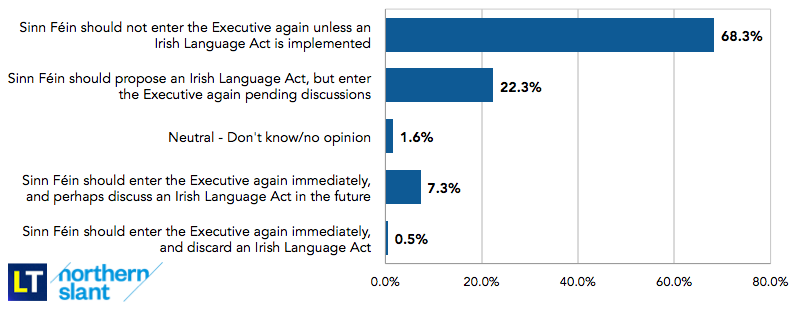
“The current Sinn Féin policy is to support an Irish Language Act. As a Sinn Féin, SDLP, or PBP voter, how important is this Sinn Féin policy to you?” 2,080 responses (weighted), displaying results for SF/SDLP/PBP voters only (LucidTalk includes PBP voters in this category due to correlations on a number of key variables)
Voters on this side of the electorate are in little mood for compromise, and many are apparently willing to keep the full restoration of the devolved institutions in the absence of Irish language legislation. Indeed, as we saw with unionist voters, a majority of nationalist voters would be opposed to a climb-down by Sinn Féin.
Beyond all of the position-taking on the issue of an Irish Language Act, a fundamental question remains: do people understand what such a piece of legislation would entail?
The LucidTalk poll asked respondents two questions on this. Firstly, it asked people to report their own personal level of understanding of what an Irish Language Act would mean. Secondly, it asked people to consider the extent to which their community in general understood what it means. There is some interesting variation.
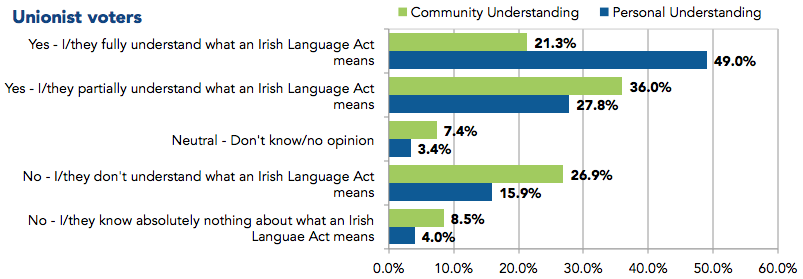
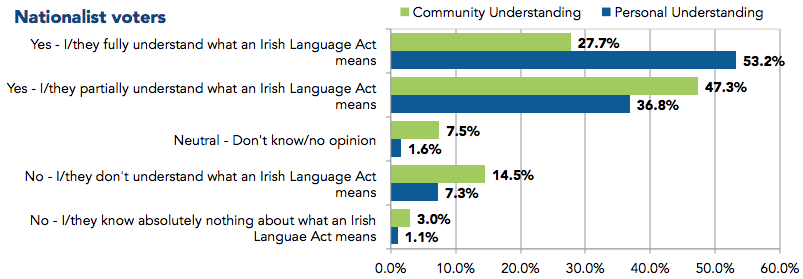
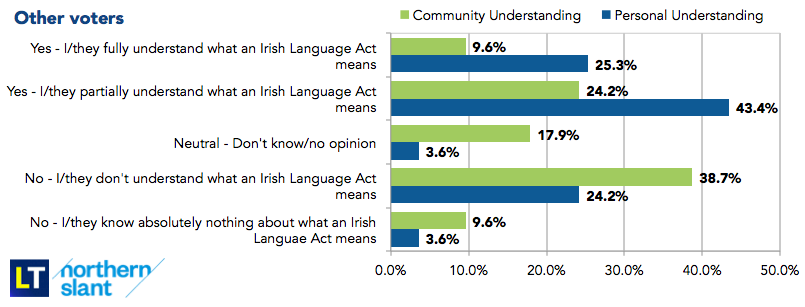
“Regardless of your own views, do you feel you understand the detail of what an Irish Language Act would mean – both you personal view, and your community’s view?” 2,080 responses (weighted), displaying results for for unionist, nationalist and ‘other’ party supporters
Nearly half of unionist respondents claim to ‘fully understand’ what an Irish Language Act would mean; only a fifth claimed to have little or no personal understanding. However, the distribution of responses was pretty different when people were asked to think about their community in general. Unionist respondents were more likely to think that other members of their community only had a ‘partial’ understanding of what an Irish Language Act would mean, while over one third thought they had little or no understanding.
Among nationalists, there was slightly less variation. More than half claimed to fully understand what an Irish Language Act would entail, and a further 37% felt they had at least some understanding. Interestingly, just under 10% admitted that they didn’t really understand what an Irish Language Act would involve. When it came to their perceptions of their community, they were more likely than unionists to think that other members of their community still understood the implications at least to some extent.
Meanwhile, among ‘other’ voters, a sizeable majority claimed to have at least some understanding of an Irish Language Act, but this time only a minority felt that other members of their community shared this level of understanding.
Overall, these results have a number of implications. To a large extent, unionist and nationalist voters are supportive of the stance taken by the DUP and Sinn Féin respectively. That makes it difficult for either party to compromise, particularly given the sizeable proportions of each community who say they would oppose such a compromise.
There are, however, less obvious implications to consider as well. Respondents were all presented with a hypothetical scenario: if Party X decided to do a U-turn, would you support it? It’s difficult to say whether respondents show low levels of support for compromise because they wouldn’t accept it, or simply because they don’t think it is likely.
Moreover, unionist and nationalist voters might hold such divergent views on an Irish Language Act precisely because the dominant parties of the two communities have adopted the relatively firm positions that they presently hold. In other words, a Sinn Féin voter might not tolerate of compromise because Sinn Féin has already insisted that Stormont will not return without an Irish Language Act. A DUP voter might not tolerate compromise because Arlene Foster explicitly ruled it out before the last Assembly election. If either party – or both – decided to embrace greater pragmatism, would their supporters be more agreeable than the data suggest? Presumably, it would depend considerably on how they presented the compromise.
Finally, it is striking that a majority of voters – unionists, nationalists and others – claim to have an understanding of what an Irish Language Act would entail. It would be fascinating to ask these respondents not only if they think they or their community understands, but to explicitly state what an Irish Language Act would involve – as they understand it.
People who vote for ‘other’ parties were considerably more likely than nationalist or unionist voters to say that they doubted other members of their community understood what an Irish Language Act would entail. Is this because they think they would be less likely to be paying attention, or is it because they feel less defensive about the issue and so are more likely to admit that levels of understanding are likely to be low?
So far, many unionist politicians have been vocal of their perceived ‘dangers’ of an Irish Language Act. Many nationalist politicians have been vocal of such legislation as an essential matter of equality. Neither have said very much at all about the actual substance, the actual details of what an Irish Language Act would entail. Despite whatever people claim to know, the public discourse on an Irish Language Act is surely so much poorer with so little substantive information.
Methodology, and more on LucidTalk
Polling was carried out by Belfast based polling and market research company LucidTalk. The project was carried out online for a period of 80 Hours from 1pm 8th September 2017 to 9pm 11th September 2017 (80 Hours). The project targeted the established Northern Ireland (NI) LucidTalk online Opinion Panel (10,103 members) which is balanced by gender, age-group, area of residence, and community background, in order to be demographically representative of Northern Ireland.
3,104 full responses were received, and a data auditing process was carried out to ensure all completed poll-surveys were genuine ‘one-person, one-vote’ responses, and also to collate a robust and accurate balanced NI representative sample. This resulted in 2,080 responses being considered in terms of the final results – the results presented in this article.
All data results have been weighted by gender and community background to reflect the demographic composition of Northern Ireland resulting in 2,080 responses being considered in terms of the final results. All data results produced are accurate to a margin of error of +/-3.0%, at 95% confidence.
LucidTalk is a member of all recognised professional Polling and Market Research organisations, including the UK Market Research Society (UK-MRS), the British Polling Council (BPC), and ESOMAR (European Society of Market Research organisations).
For more information, visit www.lucidtalk.co.uk and follow @LucidTalk on Twitter.
Also published on Medium.
